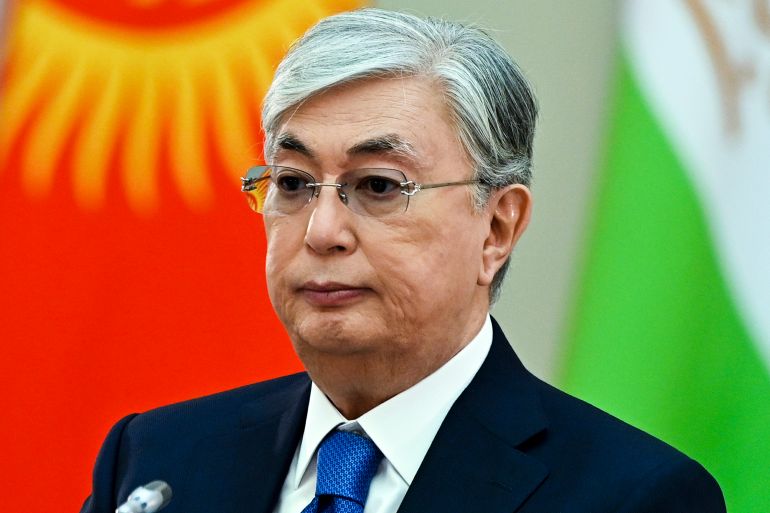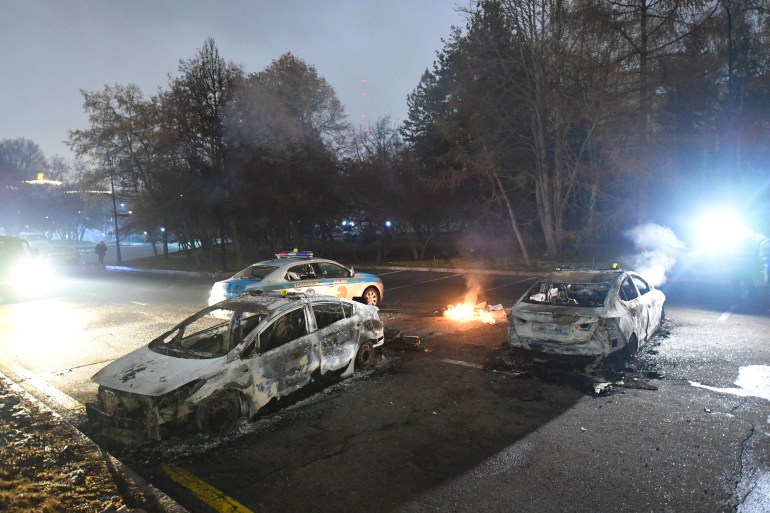Kazakhstan asks Russian-led alliance for help quelling protests
Kazakh interior ministry says eight police officers killed in unrest sparked by fuel price rise.

Kazakhstan’s President Kassym-Jomart Tokayev said he has appealed to a Russian-led security bloc for help after failing to quell days of protests in the ex-Soviet nation that have seen state buildings torched and eight security personnel reported dead.
The Central Asian country has been rocked by protests since the start of the year against a New Year fuel price increase that on Wednesday escalated into protesters clashing with police and storming government buildings.
Keep reading
list of 4 itemsIn Pictures: Kazakhstan rocked by protests
Protests erupt in Kazakhstan after fuel price rise
Kazakh dissident Aron Atabek dies weeks after release from prison
“Today I appealed to the heads of CSTO (Collective Security Treaty Organisation) states to assist Kazakhstan in overcoming this terrorist threat,” Tokayev said on state television early on Thursday.
“In fact, this is no longer a threat,” he added. “It is undermining the integrity of the state.”
Moscow leads the CSTO security alliance, which includes five other former Soviet states.
Tokayev, who earlier imposed a nationwide state of emergency, said that terrorist groups – which he said “received extensive training abroad” – are “currently rampaging” across the country.
“They are seizing buildings and infrastructure and, most importantly, are seizing the premises where small arms are located,” he said, adding that they had also seized five planes at the airport in the country’s biggest city Almaty.
“There’s currently a battle ongoing near Almaty with the air forces of the defence ministry, a stubborn battle,” Tokayev claimed.
The deputy mayor later said the airport had been cleared of protesters and was working normally.
The Kazakh Ministry of Internal Affairs said eight police officers and national guard members were killed in the unrest and more than 300 were injured. No figures on civilian casualties were released.

On Wednesday, protesters in Almaty stormed the presidential residence and the mayor’s office and set both on fire, according to news reports.
Police reportedly fired on some protesters at the residence in Almaty before fleeing. They have clashed repeatedly with demonstrators in recent days, deploying water cannon in the freezing weather, and firing tear gas and concussion grenades.
Tokayev has pledged to take harsh measures to quell the unrest and declared a two-week state of emergency for the whole country, expanding one that had been announced for both the capital of Nur-Sultan and Almaty that imposed an overnight curfew and restricted movement into and around the urban areas.
The government resigned in response to the unrest on Wednesday. Kazakh news sites became inaccessible late in the day, and the global watchdog organisation Netblocks said the country was experiencing a pervasive internet blackout, but the Russian news agency Tass reported that internet access was restored in Almaty by early on Thursday.
Although the protests began over a near-doubling of prices for a type of liquefied petroleum gas that is widely used as vehicle fuel, their size and rapid spread suggested they reflect wider discontent in the country that has been under the rule of the same party since gaining independence from the Soviet Union in 1991.
Kazakhstan, the ninth-largest country in the world, borders Russia to the north and China to the east and has extensive oil reserves that make it strategically and economically important.
Despite those reserves and mineral wealth, discontent about poor living conditions is strong in some parts of the country. Many Kazakhs also chafe at the dominance of the governing party, which holds more than 80 percent of the seats in parliament.